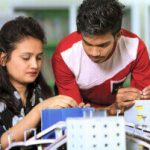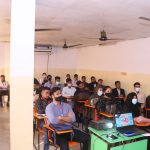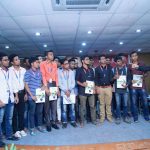Diploma in Electronics Engineering
Diploma in Electronics Engineering Objective
Diploma in Electronics Engineering program can be a great choice for building a successful career in the field of modern technology. In the Electronics Engineering sector, students have vast potential to grow professionally. An Electronics Engineer has the opportunity to work in government, autonomous, and non-governmental organizations.
Employment opportunities are available in various fields such as the Telecommunication Industry, Consumer Electronics, IT Sector, Automation and Control Systems, Embedded Systems, Broadcasting (TV/Radio), Railway Signaling, and Instrumentation. Graduates can also work in organizations like BTRC, BTCL, T&T, BTV, and other ICT and electronics-related service sectors.
In addition, a diploma electronics engineer can become an entrepreneur by starting small or medium-scale electronic product manufacturing or service-based businesses.
This program helps students develop both theoretical knowledge and hands-on skills to meet the demands of today’s technology-driven world.
Diploma in Electronics Engineering Course Duration And Assessment
Diploma in Electronics Engineering is a 4-year long program consisting of 8 semesters (1 Semester = 6 months). The final and the midterm exams of each semester is conducted under the supervision of the Bangladesh Technical Education Board (BTEB). All the exams question, answer script checking and final results are published by the BTEB. Besides this, each student has to attend the regular class test, quiz test, and semester final project. After successful completion, a student will receive a Diploma in Electronics Engineering Certificate.
The Admission procedure starts after the SSC results. There is mainly one session in a year. Students have to follow the admission announcement which is given by the Bangladesh Technical Education Board Authority. Usually, the admission procedure starts after May (depending on the SSC Result).
Career Prospects Of Diploma in Electronics Engineering
Electronics engineers are in high demand across industries such as telecommunications, IT, consumer electronics, automation, and embedded systems. They play a key role in designing and developing devices like smartphones, computers, and smart home technologies.
Career opportunities are available in both government and private sectors, including organizations like BTRC, BTCL, and T&T. Job roles include circuit design, system development, maintenance, and innovation in electronic products.
Diploma holders can also become entrepreneurs by starting electronics repair centers or manufacturing small electronic devices. Regularly checking job circulars can help you find the right opportunity in this growing field.
Career Path
Electronics engineers apply principles of electronics, signal processing, and embedded systems to design and develop electronic devices and systems. They work on a wide range of technologies—from everyday gadgets like smartphones and smart TVs to complex systems in robotics, automation, and communication.
Electronics engineers test, troubleshoot, and improve electronic components and systems. They are employed in industries such as telecommunications, consumer electronics, IT, healthcare technology, automotive, and aerospace. Government sectors and research organizations also offer strong career paths for skilled electronics professionals.
Admission Eligibility
Minimum SSC equivalent from any discipline with minimum GPA: 2.00 .
HSC (Science) Students can directly join in 3rd Semester
& HSC (Vocational) students can directly join in 4th Semester.( Passing year 2011, GPA: 2.00 )
Admission Guidelines
Students are advice to collect admission form the admission office.
To confirm the admission, students must submit
- 4 copy of recent PP size photo
- Main copy of SSC transcript
- Photocopy of Parent’s NID Card.
- Along with the properly filled admission form.
- NOTE: Students will be admitted for the limited seats.
DPI - Lab Facilities
- Circuit Lab
- Computer Lab
- Electronics Lab
- Drawing lab
- Communication Lab
- Machine Lab
- PLC Lab
- Majorant Lab









Visit Now!
